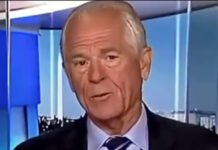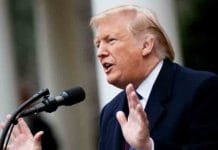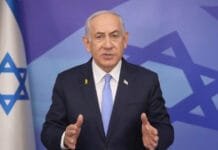
In a development shaking political and religious spheres across the Middle East, Grand Ayatollah Nasir Makarim Shirazi, Iran’s most senior Shia cleric, has issued a powerful religious fatwa condemning U.S. President Donald Trump and Israeli Prime Minister Benjamin Netanyahu as enemies of Allah. The fatwa, considered the highest form of legal and spiritual directive in Shia Islam, also called upon Muslims globally to unite in defiance and compel repentance from these leaders for their aggression against Iran.
What the Fatwa Declares: A Religious Verdict With Global Implications
The fatwa from Grand Ayatollah Shirazi, a leading Marja of the Shia world, asserts that any threat or harm directed at Iran’s Supreme Leader or Maraji (senior clerics) constitutes an act of Moharaba — a term reserved for those who wage war against God and the Islamic system. Shirazi’s words reflect Iran’s theological rigidity when it comes to safeguarding its spiritual hierarchy.
In clear and uncompromising language, the Ayatollah labeled Trump and Netanyahu as instigators of violence and upheaval in the Muslim world. His decree urged Muslims around the globe to set aside sectarian divisions and unite against what he described as a coalition of aggression targeting the Islamic Republic.
Iran’s Position: No Faith in Ceasefire, Prepared for Retaliation
The issuance of this fatwa comes amid renewed tensions between Iran and Israel, following a fragile ceasefire declared on June 24 after 12 days of devastating conflict. Despite the halt in direct hostilities, Iran’s top military officials express deep skepticism about the truce’s longevity.
Major General Abdolrahim Mousavi, Chief of Staff of Iran’s Armed Forces, conveyed to Saudi Arabia’s Defense Minister Prince Khalid bin Salman that Iran doubts Israel’s sincerity regarding the ceasefire. “If they strike again, we will answer with full force,” Mousavi said. This warning underscores Iran’s willingness to escalate if provoked, despite ongoing efforts for diplomatic de-escalation.
The conversation also reflected strengthening ties between Iran and Saudi Arabia, a formerly hostile duo now inching toward strategic military and regional cooperation.
Iran’s Nuclear Capability: Stockpile Nears Weapons-Grade Threshold
According to the International Atomic Energy Agency (IAEA), Iran’s nuclear program remains a subject of global concern. The agency confirmed that Iran possesses enriched uranium at 60% purity, dangerously close to the 90% enrichment required for nuclear weapon production.
Although the U.S. previously claimed that it had disabled major Iranian nuclear sites—including Fordo, Natanz, and Isfahan—with B-2 stealth bomber strikes, uncertainty surrounds the actual fate of Iran’s uranium stockpile. Iranian officials remain tight-lipped about whether the enriched material was destroyed or relocated before the attack.
Evin Prison Attack: 71 Confirmed Dead in Escalating War Crimes Allegations
On June 23, Israel launched a direct strike on Tehran’s notorious Evin Prison, resulting in the deaths of at least 71 individuals, according to Iran’s judiciary. Victims included guards, political detainees, and visiting family members.
This attack is considered by many in Iran as a deliberate act of psychological warfare, intended to break the morale of opposition voices within the Islamic Republic. The facility is infamous for housing political activists, dissidents, and prisoners of conscience. Iran has since vowed to hold Israel accountable on international platforms, including the United Nations Human Rights Council.
Trump’s Provocations and Iran’s Blistering Response
Former President Donald Trump, in recent statements, alleged that he “saved Ayatollah Khamenei from a painful death”, a claim that infuriated the Iranian leadership. In response, Iran’s Foreign Minister Abbas Araghchi condemned Trump’s “disrespectful and hostile rhetoric”, stating that such remarks insult not just the Supreme Leader, but millions of his followers across the Muslim world.
“If compromise is your goal,” Araghchi wrote on social media, “then your tone must reflect diplomacy, not arrogance.”
Iranian authorities view such inflammatory remarks as an extension of psychological operations orchestrated by the U.S. to destabilize Iran’s internal structure and regional alliances.
The Role of Marja and the Power of a Fatwa
The fatwa issued by Ayatollah Shirazi carries immense weight. As a Marja’ Taqlid, Shirazi holds one of the highest religious titles in Twelver Shia Islam, granting him authority to issue binding legal opinions for millions of followers. In Shia jurisprudence, a fatwa is not merely advisory, but a moral and spiritual imperative for those who accept the Marja’s guidance.
By declaring Trump and Netanyahu enemies of Allah, the Grand Ayatollah has effectively positioned resistance against them as a religious duty, not merely a political stance.
Iran’s Call for Muslim Unity: Beyond Sectarianism
Ayatollah Shirazi’s fatwa includes a powerful plea for Islamic unity, urging Muslims across denominations—Shia, Sunni, and others—to rally against what he termed “Zionist-imperialist aggression”. The call for unity is seen as an overture to countries like Saudi Arabia, Pakistan, and even Turkey, to coordinate diplomatically and defensively in support of Iran’s position.
This development may reshape Middle East alliances, as Iran attempts to present itself not only as a political actor, but as the spiritual bulwark against Western interventionism.
Fallout and Global Reaction: Rising Tensions and Diplomatic Risks
The international response to Shirazi’s fatwa and Iran’s increasing military readiness has been sharply divided. Western governments have criticized the move as an incitement to violence, while supporters in Lebanon, Iraq, and parts of Yemen have hailed it as a necessary religious stand against injustice.
In Israel, the rhetoric has escalated, with government officials declaring that any attempt by Iran to mobilize militias or carry out revenge attacks will be met with preemptive force. Tensions in Gaza, the West Bank, and the Golan Heights remain dangerously high.
Meanwhile, the United Nations and European Union are calling for restraint, even as they acknowledge the severity of recent escalations.
Conclusion: A Fatwa With Far-Reaching Geopolitical Ripples
The religious edict by Ayatollah Nasir Makarim Shirazi marks a significant turning point in Middle Eastern geopolitics. By naming two of the world’s most polarizing leaders as enemies of the divine, Iran has raised the stakes in its ideological battle with the West. As tensions simmer and alliances realign, the world watches closely.
The call for global Muslim unity, growing distrust of ceasefire agreements, and Iran’s reaffirmation of nuclear resilience all point toward an increasingly volatile region, where faith and politics intertwine in dangerous and unpredictable ways.















